love letters to kitchen tables
if our hearts connect in the kitchen, where is our culture headed?
This ‘Art Of’ is still free, before most of these writings go behind a paywall next Sunday. If you find connection in this work, would you send to a friend?
Noticing creates art:
Noticing is the most important aspect of my job. Noticing, as in— quietly observing the overlooked, the under-discussed, the whispers that lure us to linger a moment more— Job, as in— painting, drawing, writing— creating something tangible out of these noticing’s.
When you’re depressed, there is much less observation. The dishes pile up, the texts from friends become a chore, the sun rises and sets without any regard to your suffering. Brushing your teeth feels similar to climbing Mount Everest, and you sure as hell aren’t stopping to notice the hummingbird graze the flower on your morning walk— to wonder how its wings can move so quickly— in fact, you stop taking walks altogether. Coffee no longer pulls you from the sheets, and you stare as the world’s colorful saturation slowly circle down the drain.
Without the noticing, there is no art. I’m grateful to be (slowly) noticing the way the light dances through the windows in the morning, once again. My brain is starting to make new connections; little threads that allow me to create work and feel satisfied by it. I am still in the process of crawling out of the trenches, but this noticing feels like immense relief. I am back in the world again.
One of my fixated thoughts lately revolves around the presentation of love through food, through breaking bread, through feasts or empty plates left at dining room tables. I’m exploring more of these concepts through my work, and you’ll see more of that as we go. No matter where in the world I am, or what my day consists of, it usually begins the same.
I am standing in the kitchen, topping my coffee with cinnamon. Some of life’s most intimate moments are found here. It starts with coffee; my daily ritual.
I’m not sure there is any act of love greater than waking up and pouring a cup of coffee for someone you love, carefully and steadily journeying across the floors with it, challenged by your sleepy feet, to delicately swap it between hands. I have woken before you, ground the beans, carefully poured them into the filter while filling the water. I have stirred this cup with creamer and cinnamon because I want to share this moment with you, before the world gets in the way.
The kitchen feels like the heart space of every home. It is a testament to how safe we feel with the person whose created it. Sometimes we are awkwardly lingering at the kitchen counter, waiting to be invited to a seat in the home of someone we’re seeing for the first time….or in others, we are flinging open the fridge door, with no hesitation, to take anything we please out of it— a sense of belonging so quiet and so rare we hardly stop to think as we pull out a can of seltzer from our best friend’s fridge. When we know which drawer to open for the extra silverware from as the takeout arrives, how to properly load the dishwasher in the same way they prefer to, that we can fling open the cabinets in search of a yummy snack without needing to ask— that is a form of intimacy often overlooked. We stand in the refrigerator light at 2am, when I am unable to sleep, reheating a snack from earlier in the day or the leftover cake from the party— scooping into bowls for two, as we sleepily take our designated spaces around the small bistro table— the sounds of our chewing grounding me back into a sense of belonging. My kitchen is your kitchen, my heart is your heart.
“Out of the kitchen! Out of our way!” were words I never heard as a child, even in the midst of a busy restaurant. My dad let me peer over the counter as he seasoned dishes, my grandma would slice me a fresh bit of bread from the loaves she had taken out of the oven, they would invite me into the bustling dining room during later dinner hours to meet friends and snack on appetizers. I was allowed to observe, witness, and of course— eat. This is how you properly plate a dish. This is how you set a table and fold a napkin. This is how you clean a glass and garnish it. This is how you peel a carrot quickly and efficently and this is how you properly hold the knife when chopping.
I was always encouraged to notice.
Mangia, mangia! We heard around every table, every counter top, every meal. You don’t realize as a child how fortunate you are to have the smells of the kitchen wafting, changing, luring you to indulge. You don’t yet understand the nuance of the adults in your life gathering around to pour wine in one another’s glasses, carrying in the hot dishes from a two hour drive to add to the menu— the subtle connection happening in front of your eyes— almost as unseen as magic. You are witnessing what it means to love, to receive, to nourish— if you only understood how to notice.
When I think back on it, it comes in bits and pieces, all fragmented. I’ve seen photos of the handmade birthday cakes my grandmother made me each year, decorated with baby’s breath and fresh flowers from her garden. I do remember the ache in my stomach I fought off for years as a child each New Years eve, as we upheld our family tradition of not eating until the clock struck midnight. How the fish, the bread, the melted cheeses and salted meats never tasted better than they did at 12:05. As the years passed, life got busier and dinners were spent eating hotdogs at the ball fields or take out at the Chinese resturaunt across from my dance studio between long hours of classes. Our new year’s eve celebrations diminished, and family dinners became few and far between. The restaurant sits empty since the pandemic, it’s colors fading and side walking cracking more each passing year.
Sometimes we notice change in our lives at the dinner table, in the kitchen, before anywhere else.
When my fiancé and I first split up four years ago, the loneliest place for me, was eating. The dining table. The kitchen counter. The bar at the restaurant.
Even though the connection between us was over long before his physical presence left the table, the silence of learning to eat alone was the kind of hurt I couldn’t stomach. I started cooking my dinners and carrying it into my bed, unable to face the set for one. We are so fearful of being alone in proximity, sometimes we stay at the table longer than we should, begging for scraps.
During this time, we were preparing our first immersive installation here in Charleston, titled CONSUMPTION. I briefly explored this concept with the work, Craving, where I sat and posed for several self-portraits at my kitchen counter, fake cigarette lit in my hand, posing with my sand and empty take-out containers. I was struggling with severe disconnect in my sense of self, and noticed it reflected back to me in these moments. How as a culture, we order take out more and more because we’re too exhausted to cook a nutritious meal. How often we are eating alone, late at our desk, working away from our family- or eating in separate rooms because family dinners are too much. Take out, takes less: the lack of time, the lack of care, the emptiness at our dinner tables. As we sit to nourish, do we notice the lack? Where does our mind wander, or will we allow it wander at all? Will we desensitize to quiet it all?
The pandemic shifted something slowly in me, 800 miles away from my family’s closed restaurant on Main Street. With more time at home, and my sister moved in during lockdown, and we started cooking more. Dumplings from scratch. Birthday Cakes. Veggie Curries and homemade sourdough bread. We spent nights in the kitchen, passing tastes between one another as we tried new dishes we found online. We started setting the table again, zoom-dining with friends from home, and challenging ourselves with new recipes. My fear of kitchens lessened. I became comfortable approaching the hostess without hesitation, “it’s just me, can I sit at the bar?” or spending an hour to cook myself an elaborate meal, fixed with lit candles and jazz music. In feeding myself, I learned to love myself.
I have had the privilege of being seated at a very diverse concept of dining room tables. Where there is food, there is love— whether or not you've got a place setting or a napkin across your lap. My kitchen tables have been under the stars at Bryce Canyon, the ledge overlooking the Colorado River, in the desert of Arizona and the hilltops of the Italian Dolomites.
They have also been set in the dining room of my family’s restaurant that my great-grandparents created with their own two hands after immigrating from Germany— roaring with laughter as generations gather to enjoy recipes passed down for decades. My kitchen tables have been take out boxes of noodles along the Carolina shore, bowls of ice cream in the warmth of my bed, pizza that has been cooked in the lava-filled caves of a volcano, charcuterie boards of meats and cheeses on the floors of yoga studios and friends’ apartments. My kitchen table has been me, alone, in my studio apartment, delicately rolling the dough through the sugar with my fingers, remembering my grandmother’s gentle hands overtop mine as I do. There is something to learn in each of these spaces. Love is woven through each of them.
When my friends and I go camping, the food after a long hike is our favorite part. Ramen and freeze-dried food packets are not the choice, unless of course we’re backpacking. Instead, there’s fish, potatoes, charcuterie boards being chopped and snacked on with martinis as we cook asparagus or veggie curry, with no phones, no distractions— no commitments other than creating this meal and eating it together. Something special happens, that I rarely experience in any other area of life. We are seated around the fire, watching it flicker, telling stories and enjoying a meal. It feels like an ancient wisdom; a place I’ve been before, the place I am supposed to exist in.
We have been social eaters since the beginning of time. Studies show those who eat in communal spaces often feel more satisfied with life, are engaged in their communities, are more trusting of other people, and also have more friends they can depend on. Social bonding happens naturally, when we are passing the plate and saying, “here, please try this, I made it for you.”
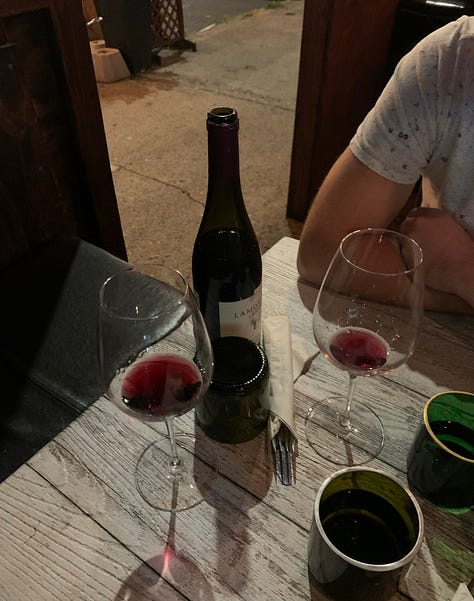

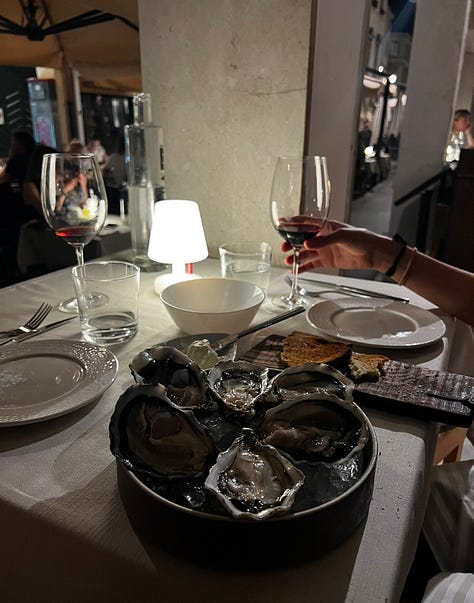

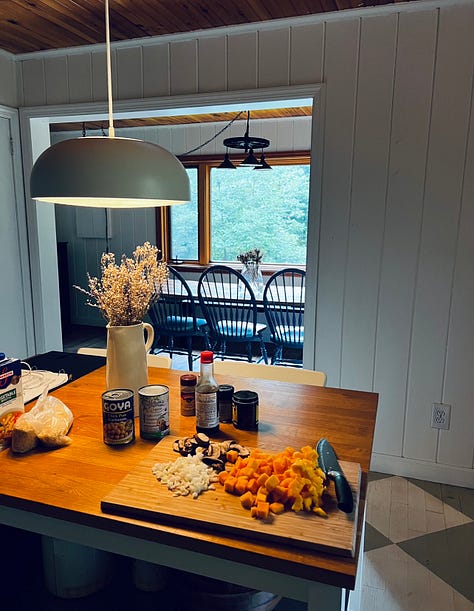

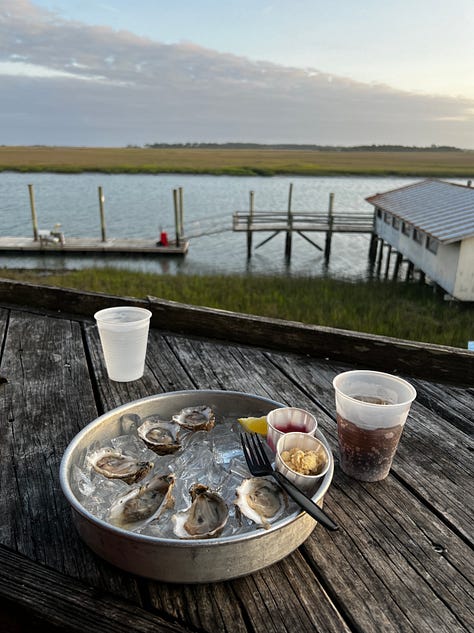
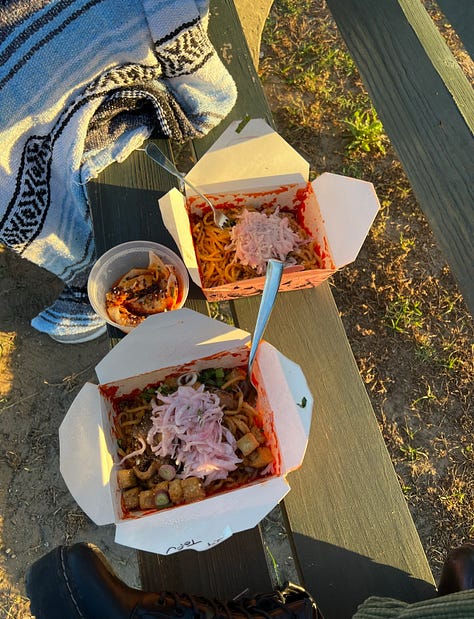
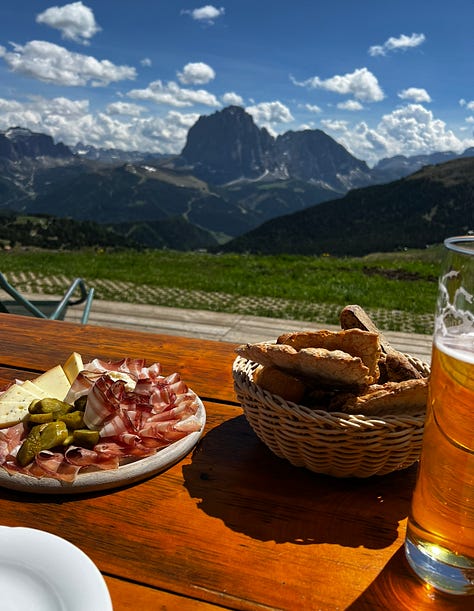
As our lives become more exhausting from the never-ending work schedules and responsibilities, Uber Eats is more and more appealing. As our brain becomes more addicted to the dopamine hits of scrolling TikTok as we ignore our family members or partners during a meal, we continue building barriers around our much-needed connection. We trudge through the day to day, feeling depressed, lonely, and desperate for a sense that we are alive. The things that grounded our ancestors to the world around them: growing and cooking food, digging in the earth, looking up at the sky— are being removed from our lives by a culture that needs us to forget. To be more addicted to the chase for more, the chase for changing and hating ourselves, the chase for girlbossing and arguing with one another and accepting that we cannot afford the nutritious food our bodies and minds crave—pushing us farther and farther away from the need to take a seat at our own dining room table.
The longer I am away from the kitchen, the sicker I feel. And so I open my fridge on the mornings when food will surely taste like chalk, and I am too tired to do the dishes, and I do not have time because there are not enough hours in the day. I take out the vegetables and wash them and chop the zucchini the way my dad taught me in the restaurant kitchen 17 year ago, with my fingers bent under and the blade pressed against the knuckle. I can still smell my grandmother’s bread and the way the first taste of seasoned fish melted in my mouth as my dad snuck me a piece —after noticing my curiosity in the midst of a busy dinner shift. I toss the veggies in the bowl and smile, because I have the privilege of making another meal for myself, for pausing my day to nourish the same way I witnessed others do so in kitchens across the span of my life— to remember that love— whether it has passed, or changed— is truly everywhere, if we are simply willing to stop and notice it.
If you enjoyed reading this, would you consider upgrading to paid? For less than a cup of coffee a month, you will be supporting my devotion to studio time without the pressure of creating for financial sake. You are also supporting my life-long dream of one day being a published writer.
After this Sunday, more of these writings will be behind a paywall. I will be working to add new and exciting things as well: such as podcast episodes and communal chats.




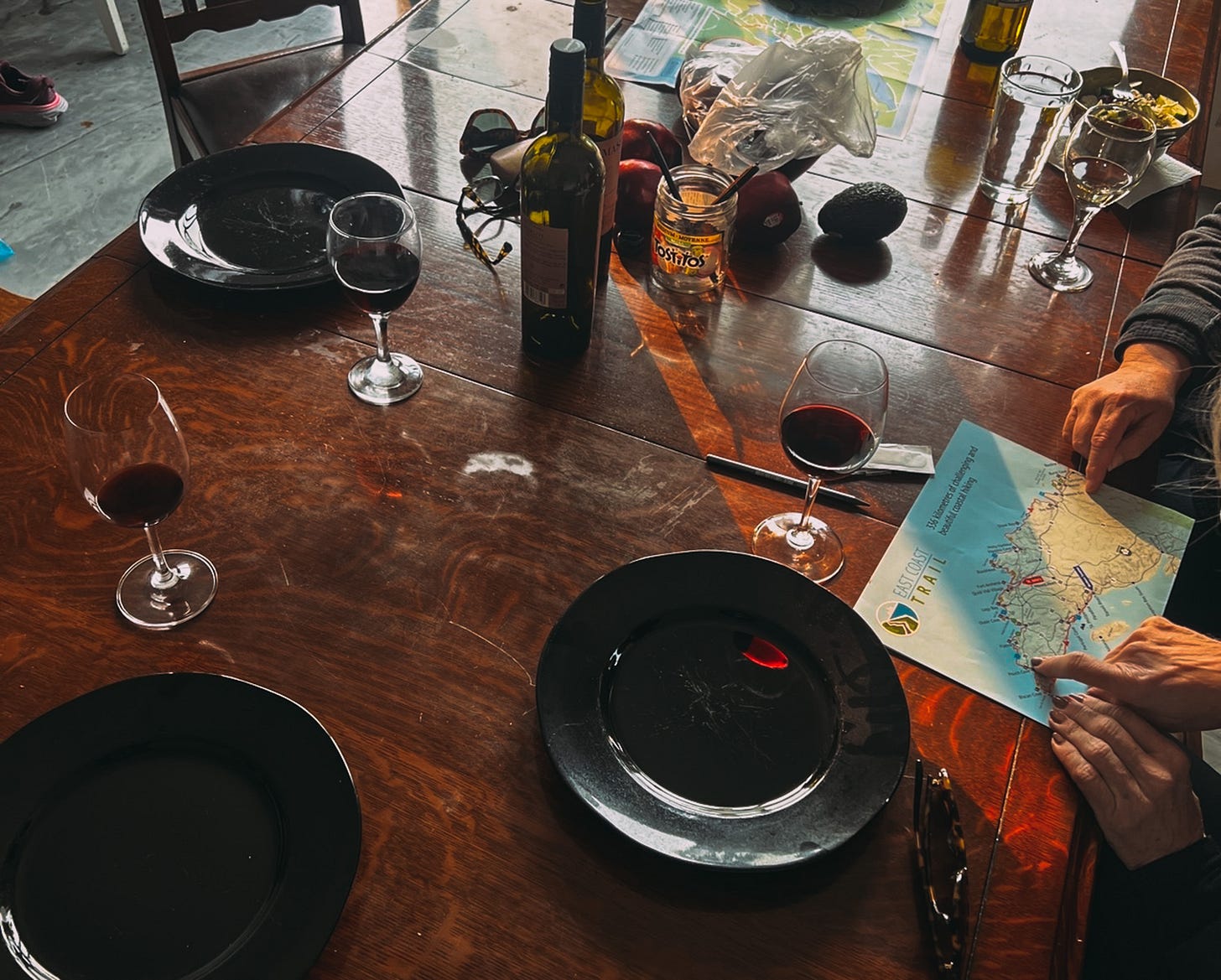
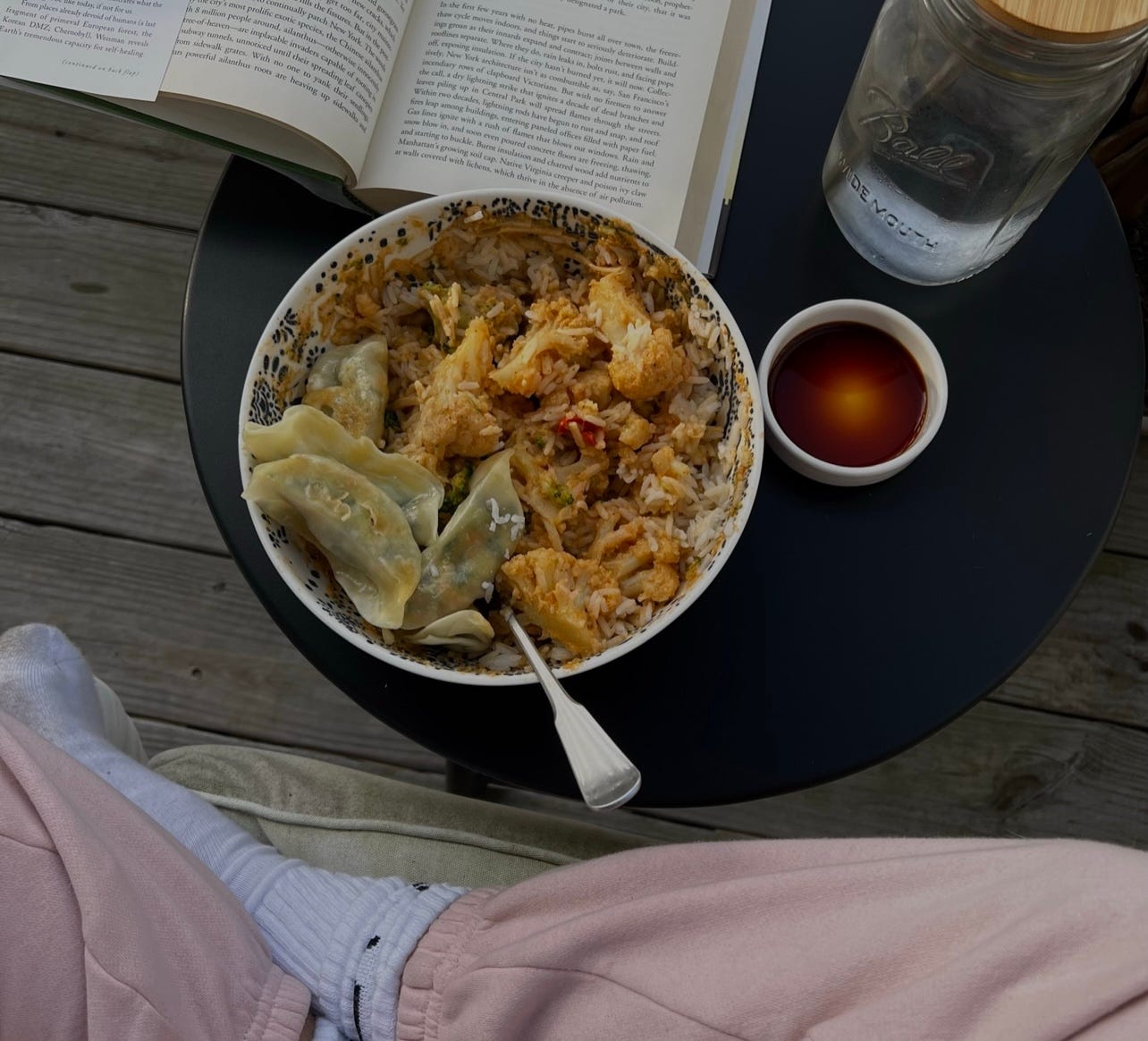
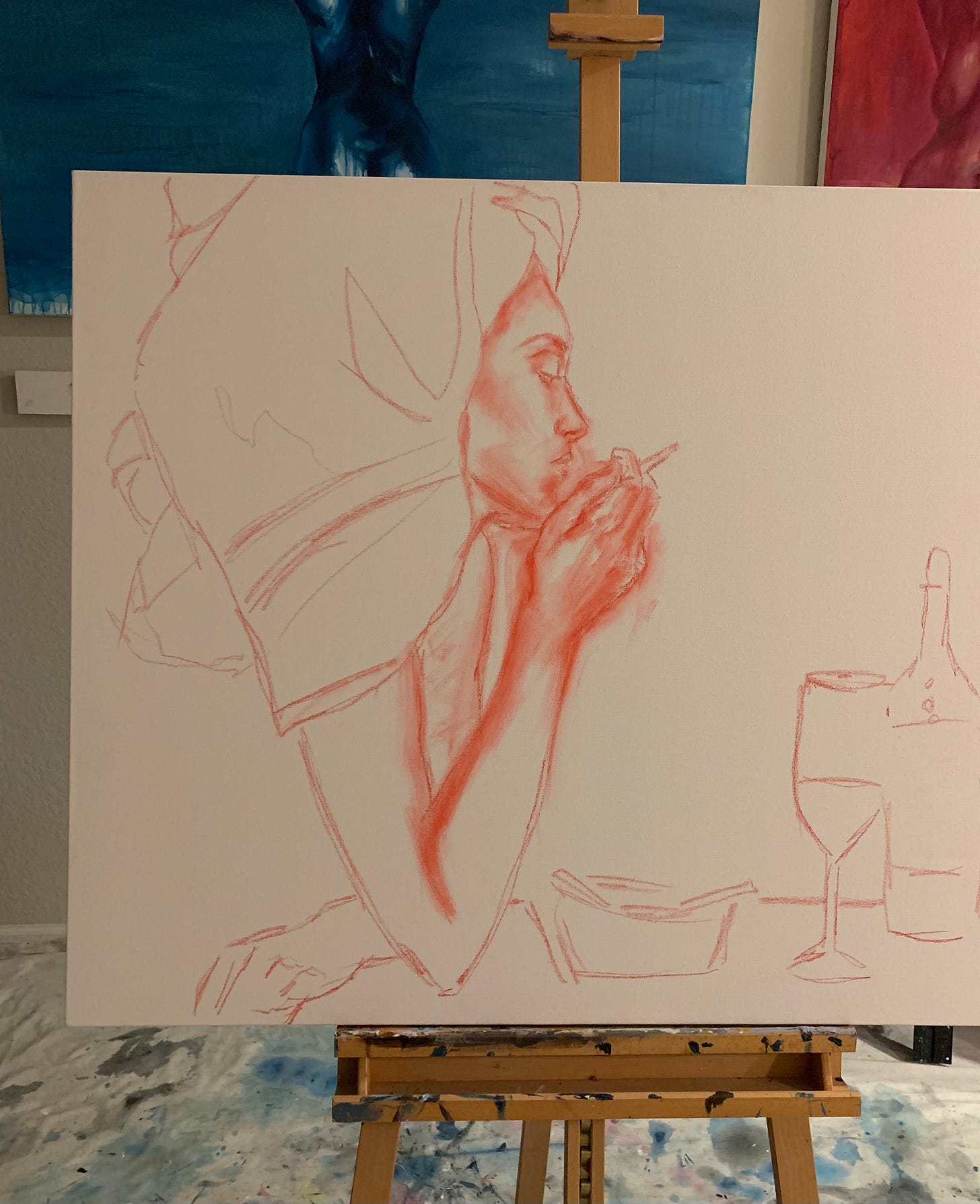

I come from a big Polish family who spend our most intimate moments in the kitchen, drinking coffee, making meals, baking cookies, sharing stories, laughing and crying over wine. There is something so special about moments and memories together in kitchens and you captured those feelings so well here in your piece <3 thank you for sharing.
Having grown up with Italian grandparents that owned a restaurant provisions business, this resonates so deeply with me. Holiday meals full of laughs and fuller bellies. The separate kids’ table until you were old enough to sit with the “adults”. The proverbial “your eyes are bigger than your belly”. Where has it all gone? Are we truly that exhausted? Do we even want to put that kind of time and energy into “entertaining” family? Allegedly time heals all wounds. But is it the salve that motivates people to connect? To remember? To want to break bread?